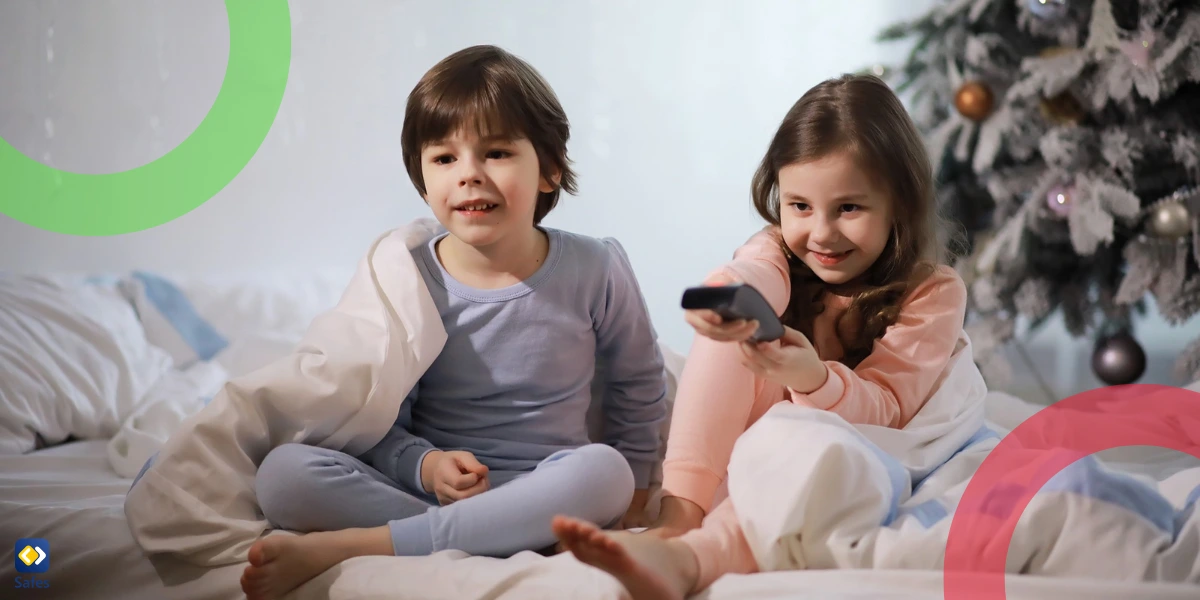CoComelon has become one of the most popular children’s shows worldwide, with its bright animations, catchy nursery rhymes, and repetitive storytelling format. Available on YouTube and Netflix, the show captures the attention of millions of toddlers daily. While parents often appreciate the temporary peace it brings, concerns have emerged about its potential negative effects on child development, behavior, and emotional well-being. Questions about overstimulation, delayed speech, and screen addiction have sparked heated discussions among experts and caregivers. In this blog post, we’ll dive deep into the question of “Is CoComelon bad for kids”, explore expert opinions, and provide guidance on how parents can manage their child’s screen time effectively.
Download and Start Your Free Trial of the Safes Parental Control App
What is CoComelon and Why is it So Popular?
CoComelon is an animated children’s show primarily available on YouTube and streaming platforms like Netflix. Created by Treasure Studio, it focuses on nursery rhymes, educational songs, and simple life lessons. Its bright colors, repetitive patterns, and cheerful music are carefully designed to keep young viewers engaged.
One key factor behind CoComelon’s success is its predictable and easy-to-follow content. Each episode contains simple lyrics, repetitive phrases, and familiar melodies, which appeal to toddlers’ learning patterns. It creates a comforting and engaging viewing experience, making it an instant favorite in many households.
Additionally, the show aligns with busy parents’ needs. For caregivers juggling multiple tasks, CoComelon serves as a virtual babysitter, holding a child’s attention for extended periods. Its accessibility on platforms like YouTube and Netflix makes it easy for parents to play episodes on any device.
However, while the show’s popularity is undeniable, concerns arise regarding whether its structure and fast-paced visuals are truly beneficial—or potentially harmful—to a child’s development.
The Overstimulation Debate: Is CoComelon Too Intense for Kids?
Overstimulation occurs when a child is exposed to intense visual or auditory stimuli, overwhelming their developing brain. CoComelon’s bright colors, fast scene changes, and constant musical background have led experts to question if it overstimulates young viewers.
Pediatric psychologists suggest that rapid scene transitions and repetitive animations can make it harder for children to process information. Their developing brains might struggle to adjust to slower-paced activities like reading, creative play, or focusing on real-life conversations.
Moreover, CoComelon’s overstimulation from screen time has been linked to shorter attention spans and reduced patience. If children become accustomed to constant visual excitement, they might find everyday tasks—like playing with blocks or listening to a bedtime story—less engaging. While occasional exposure to CoComelon isn’t inherently harmful, excessive daily viewing could have long-term effects on a child’s ability to focus, self-soothe, and engage in imaginative play.
Behavioral Changes Associated with CoComelon
Parents and educators have reported noticeable behavioral changes in children who frequently watch CoComelon. These changes include increased irritability, difficulty transitioning away from screens, and heightened emotional responses when denied access to the show.
The repetitive and highly stimulating nature of the program may create dependency. Children may become accustomed to the immediate gratification CoComelon offers, making other forms of play or entertainment seem less appealing.
Another concern is tantrums triggered by screen time limits. When children become overly attached to watching CoComelon, any interruption—like turning off the screen—can result in intense emotional meltdowns.
Experts suggest balancing CoComelon with other forms of play and screen-free activities. While the show isn’t directly responsible for poor behavior, over-reliance on it as a primary source of entertainment can contribute to these behavioral patterns.

Is CoComelon Bad for Speech Delay in Kids?
One of the most debated concerns surrounding CoComelon is whether it contributes to speech delays in young children. Research shows that excessive passive screen time can reduce the opportunities for meaningful social interaction, a critical component of language development.
CoComelon’s repetitive songs and scripted interactions might not provide the conversational back-and-forth that children need to develop strong language skills. While kids may memorize lyrics, it doesn’t replace real-world conversations with parents or peers.
Additionally, prolonged screen time can reduce face-to-face interaction with caregivers. When children are glued to screens, they miss out on essential cues like facial expressions, tone of voice, and physical gestures that contribute to effective communication.
Parents are encouraged to watch shows like CoComelon alongside their children and use them as teaching tools. Pausing episodes to ask questions or mimic actions can make the experience more interactive and language-rich.
Why Moderation is Key in Screen Time
CoComelon, like any digital content, isn’t inherently bad. The real issue lies in excessive screen time and a lack of balance with other activities. Experts from the American Academy of Pediatrics recommend no more than one hour of screen time per day for children aged 2–5.
Moderation ensures that children still engage in essential activities like outdoor play, reading, creative arts, and face-to-face conversations. These activities are vital for physical, social, and emotional development.
It’s also important for parents to set clear boundaries around screen time. Creating consistent routines—like no screens during meals or before bedtime—can prevent screen dependency from forming. Parental control apps, such as Safes Family, can be helpful in monitoring and managing children’s screen time, ensuring a balanced approach to digital media consumption.
Practical Tips for Parents to Use CoComelon Responsibly
Parents can take an active role in making CoComelon a healthy part of their child’s routine. First, set screen time limits and stick to them. Consistency helps children develop a better understanding of boundaries. Second, try co-viewing episodes with your child. Pause frequently to ask questions, repeat words, or discuss characters’ actions. This encourages engagement and boosts language development.
Third, diversify entertainment options. Encourage your child to engage in non-screen activities such as drawing, building blocks, or outdoor play. Variety is essential for holistic development. Lastly, use parental control tools like Safes Family to manage access and set age-appropriate restrictions on devices. This helps create a safer digital environment for young viewers.
Why Parents Need Parental Controls for Kids’ Screen Time
Parental controls are essential for managing the type and duration of content children consume. Tools like Safes Family empower parents to monitor screen time, block inappropriate content, and set usage schedules.
With shows like CoComelon available on multiple platforms, it’s easy for screen time to spiral out of control. Parental controls help enforce boundaries, ensuring kids don’t exceed recommended screen limits.
These tools also provide insights into viewing habits, helping parents make informed decisions about content consumption. For example, if a child is spending excessive time on YouTube, parents can adjust restrictions accordingly. Using a third-party parental control app creates a structured digital environment, allowing parents to balance entertainment with other essential activities.
Conclusion: Is Cocomelon Okay for Kids?
CoComelon, with its bright animations and educational songs, has become a household favorite among young children. However, concerns around overstimulation, behavioral changes, and speech delays remind us that moderation is key. While the show isn’t inherently harmful, excessive exposure can have unintended consequences.
Parents play a vital role in managing their child’s screen time and ensuring that CoComelon remains a positive influence. By setting boundaries, engaging in co-viewing, and leveraging parental control tools like Safes Family, parents can create a balanced approach to digital entertainment. Take control of your child’s screen time with Safes Family. Monitor content, set time limits, and ensure safe digital experiences for your kids. Start your free trial today on iOS and Android!
Your Child’s Online Safety Starts Here
Every parent today needs a solution to manage screen time and keep their child safe online.
Without the right tools, digital risks and excessive screen time can impact children's well-being. Safes helps parents set healthy boundaries, monitor activity, and protect kids from online dangers—all with an easy-to-use app.
Take control of your child’s digital world. Learn more about Safes or download the app to start your free trial today!




